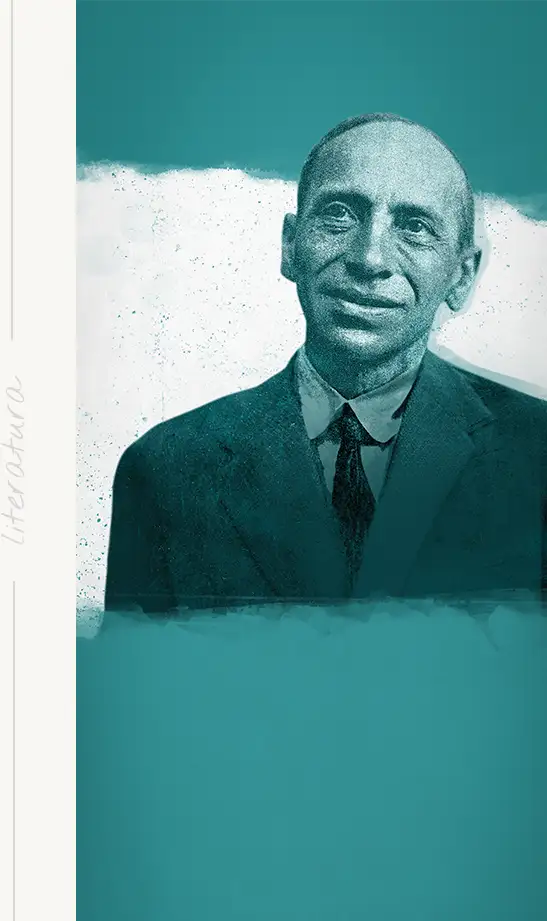
Mordechaj Gebirtig
4. 5. 1877, Krakov — 4. 6. 1942, ghetto v Krakově
Básník a autor písní v jidiš působící v meziválečném a válečném období v Polsku. Po celý svůj život byl spjat s krakovskou židovskou čtvrtí Kazimierz.
Narodil se jako Markus Bertig 4. května 1877 v Krakově. Základní vzdělání získal jak v židovské chederu, tak v obecné škole. Následovala praxe u truhláře, kde se tomuto řemeslu nakonec i vyučil. Aktivně se angažoval v záležitostech zlepšení existenčních podmínek dělníků a jeho tvorba vyjadřovala socialistickou angažovanost. Během 1. světové války sloužil jako sanitář v krakovské vojenské nemocnici a po jejím zakončení byl zaměstnán v truhlářské dílně svého bratra Leona. Zkoušel štěstí i jako ochotnický herec.
Postupem času se začal podepisovat jako Mordechaj Gebirtig, doslova „Znovuzrozen“ (z něm. Geburt – „zrod“). Jeho první báseň Der Generalsztrajk (Generální stávka) vyšla v roce 1905 v týdeníku „Socjaldemokrat”. V roce 1920 mu vyšla básnická sbírka Folkstimlech (Na lidovou notu) a v roce 1936 publikoval sbírku lidových písní Majne lider (Mé písně). Jeho tvorba psaná v jidiš byla interpretována na jevištích řady židovských divadel po celém světě. Mordechaj je autorem písně Unzer sztetl brent (Naše město hoří), která je připomínkou pogromu v polském městečku Przytyk, k němuž došlo 9. března 1936. Tato skladba se stala hymnou Židovské ozbrojené organizace (Żydowska Organizacja Bojowa – ŻOB) a často ji zpívali obyvatelé krakovského ghetta a vězni v koncentračních táborech. Po válce se stala symbolickou písní přeživších Holocaust.
Okupaci Mordechaj Gebirtig strávil v Łagiewnikách (dnes část Krakova) a následně v krakovském ghettu. Zahynul 4. června 1942 – byl zastřelen členem Gestapa během nástupu do transportu směřujícího do koncentračního tábora. Jeho písně zachycující předválečný život v židovském městském prostředí se proměnily ve vzácné svědectví ztraceného světa.
kreativita
kreativita
—
Our Town Is Burning („Undser shtetl brent”)
Voice: Bente Kahan
Accordion: Dariusz Świnoga
Translated into English by Dahlia Pfeffer Luxemburg
Recording of a concert in Stockholm City Hall, 1995.
It’s burning brothers, it’s burning
Oh, our poor town is burning
Angry winds and loud noises
Are coming crushing and blowing away
The wild flames are growing
Everything around is burning!
And you are standing just like that and watching with folded arms
And you are standing just like that and watching
Our town is burning!
It’s burning, brothers, it’s burning
Oh, our poor town is burning
The fire tongues have already engulfed the whole town
And the evil winds are screaming
Our town is burning
And you’re standing just like that and watching with folded arms
And you’re standing just like that and watching
Our town is burning!
It’s burning, brothers, it’s burning
Oh, God forbid, the moment is coming
that our town together with us
will turn in flames into ashes
and, like after a battle, only empty, black walls will remain
And you’re standing just like that and watching with folded arms
And you’re standing just like that and watching
Our town is burning!
It’s burning brothers, it’s burning
And only you can help it
If the town is dear to you,
Take the buckets, put out the flames
Put them out with your own blood!
Show that you can do it!
Don’t stand, put out the fire
Our town is burning!
„Sbohem, můj Krakove! Bente Kahan zpívá písně Mordechaje Gebirtiga” („Farewell Cracow. Bente Kahan sings Mordechaj Gebirtig”)
Text a hudba: Mordechaj Gebirtig
Zpěv: Bente Kahan
Akordeon: Dariusz Świnoga
Housle: Mirosław Kuźniak
Reyzale
Translated from Yiddish into English by Bente Kahan
I am standing in a street
carefully I take a peek
at that old and wooden home
where Reyzl lives, my dearest one
each night before her house her heyzl
I walk by and hum
whistle and then call out Reyzl,
Come, Come, Come
A window suddenly unlocks
the little house is waking up
A sweet voice sounding in the street
my Reyzale she starts to speak
“Wait a while, it’s mother’s order
soon I will be free
walk once more around the corner
One, Two, Three”
Happily I take a walk
cracking nuts, I sing. I talk
Then hear my sweet Reyzale
runs down a staircase-ale
lovingly, I look her way
embrace my only one
kiss her on her forehead and say:
Come, Come, Come
“Dovidl, I’m begging you,
whistle is not a thing to do
“I hear he’s whistling” says my Mum
she’s so upset and won’t be calm
“whistling, she says, is not Jewish
for them it may be
Just give a simple sign in Yiddish
One, Two, Three
“I will not whistle as you say
I promise you that from today
I will become a religious Jew
because I am in love with you
Every Shabes, my dear Reyzl
I will please your Mum
praying in that little kleyzl
Come, Come, Come”
“I believe you, oh my lad
and that’s why, dear Dovidl
I’m knitting a nice tfiln-bag
with a David star, mogin-Dovidl
If your classmates they will like it
say it is from me
that Reyzale my love she knits in
One, Two, Three”
“A present, thanks, that’s really sweet,
Oh, Reyzale, I love you so
I love your mother, I love your street,
I love your home, please do not go
I love your little house, your heyzl
that’s where you are from
But now your mother’s shouting “Reyzl:
Come, Come, Come”
Once again I start to walk
cracking nuts, I sing, I talk
Then I hear my dearest one
runs up the stairs, I’m left alone
The street is calm so it seems
my Reyzl is back home
Come to me in my dreams, Oh
Come, Come, Come
